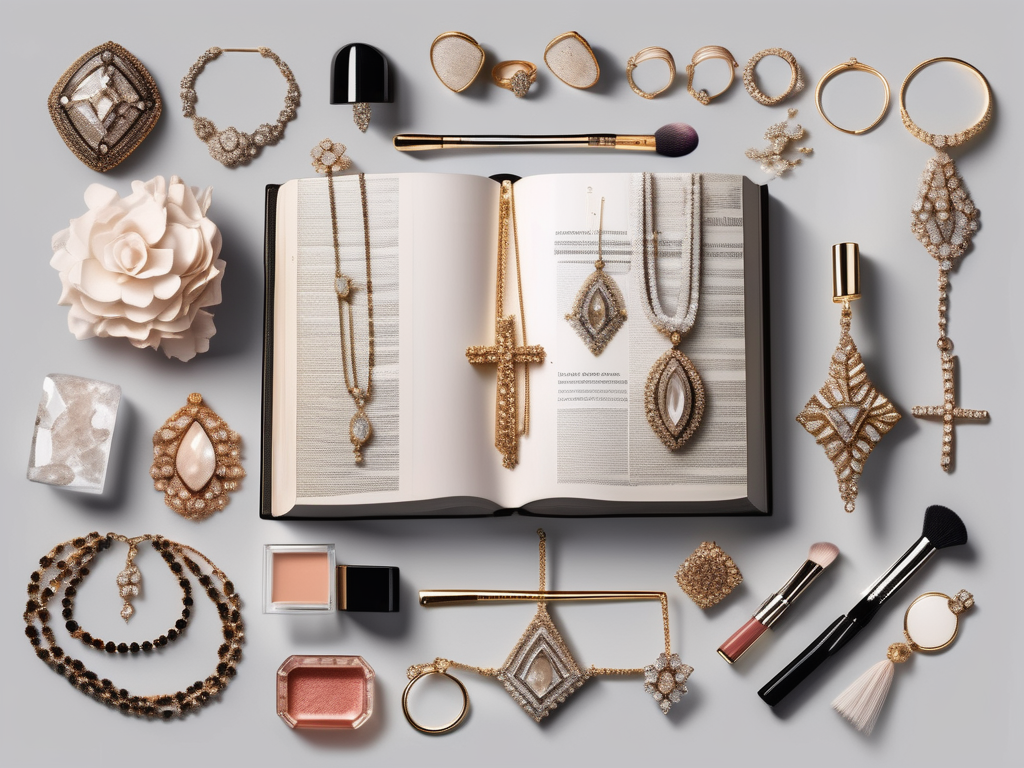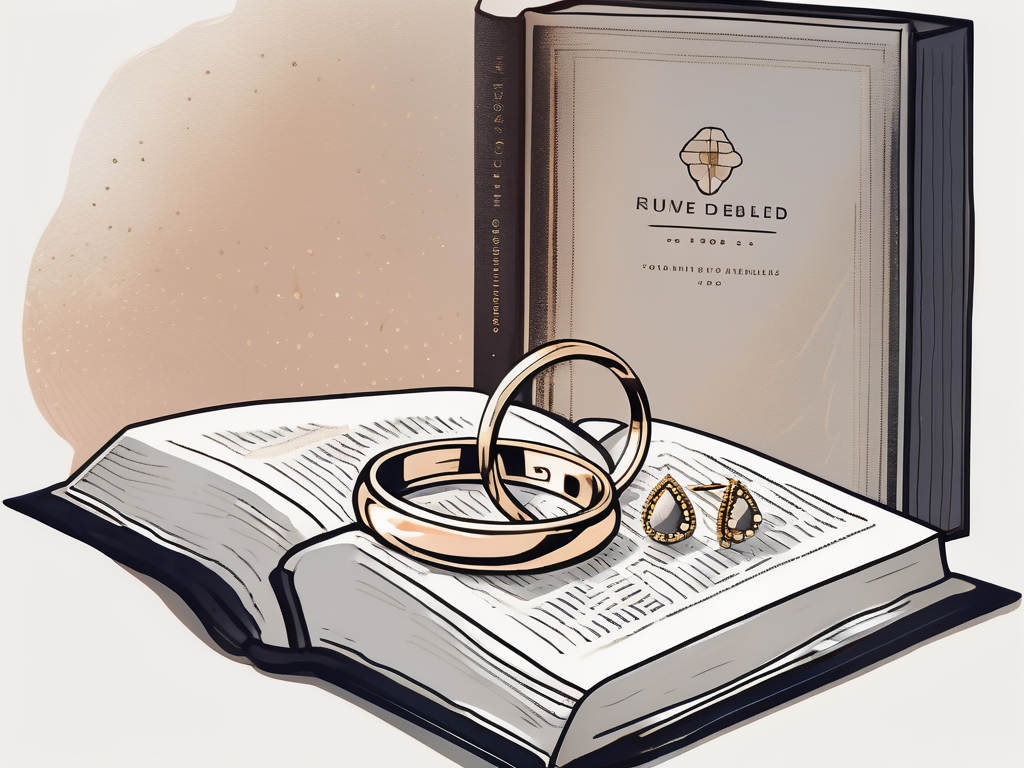As Christians, we turn to the Bible to guide us in all aspects of life, including our personal appearance and adornment. The topic of wearing jewelry and makeup has long been a subject of debate among believers. Some argue that the Bible explicitly forbids these forms of adornment, while others believe that it is a matter of personal conscience and cultural context. In this article, we will explore the biblical perspective on jewelry and makeup, examine different interpretations of relevant passages, delve into theological views on the topic, discuss the relationship between personal adornment and Christian virtues, and address the practical implications for modern believers.
Understanding the Biblical Perspective on Adornment
Before we dive into specific biblical passages, it is important to understand the overall perspective on adornment in the Bible. In the Old Testament, jewelry was often associated with wealth, status, and religious significance. The New Testament, on the other hand, focuses more on the internal qualities of a person rather than their outward appearance.
Let’s explore further the significance of jewelry in the Old Testament. In this ancient context, jewelry held great value and meaning. It was not merely a fashion statement, but a symbol of wealth and social standing. For instance, in the book of Genesis, we encounter the story of Rebekah, who receives a nose ring and bracelets from Abraham’s servant as a sign of betrothal. This exchange of jewelry signified a significant event in their lives, highlighting the importance of jewelry in their culture.
Additionally, the Old Testament presents us with a cautionary tale involving jewelry. In the book of Exodus, we read about the Israelites offering their gold jewelry to create the golden calf. This incident serves as a reminder that while jewelry can be a symbol of status and wealth, it can also lead to idolatry and misplaced priorities.
The Old Testament and Jewelry
In the Old Testament, we find numerous references to jewelry as a symbol of wealth and status. For example, in the book of Genesis, Rebekah receives a nose ring and bracelets from Abraham’s servant as a sign of betrothal. In Exodus, we read about the Israelites offering their gold jewelry to create the golden calf. These passages demonstrate that jewelry was indeed a part of ancient culture and carries both positive and negative connotations.
However, it is important to note that not all instances of jewelry in the Old Testament are associated with negative connotations. In the book of Proverbs, for example, we find verses that highlight the beauty and value of jewelry when used in moderation and with wisdom. This suggests that jewelry, when approached with the right mindset, can be appreciated as a form of artistic expression and personal adornment.
The New Testament and Makeup
Turning our attention to the New Testament, explicit references to makeup are scarce. However, passages such as 1 Timothy 2:9-10 emphasize the importance of modesty and good works rather than external adornment. While some argue that this implies a prohibition on makeup, others interpret it as a call to prioritize inner virtues over vanity.
It is worth noting that the New Testament places a greater emphasis on the internal qualities of a person, such as kindness, humility, and love, rather than their outward appearance. This shift in focus encourages believers to cultivate a character that reflects the teachings of Jesus Christ, rather than being preoccupied with external adornment.
While the Bible does not explicitly condemn the use of makeup or jewelry, it does provide guidance on how believers should approach these forms of adornment. The key lies in maintaining a balanced perspective, recognizing that true beauty comes from within and should be accompanied by virtues such as humility, kindness, and love.
Interpreting Biblical Passages on Jewelry and Makeup
When interpreting biblical texts, context is key. It is important to consider the historical and cultural background of the passages in question. Furthermore, we must acknowledge the influence of our own cultural biases on our interpretation of scripture.
Contextualizing Biblical Texts
In order to understand the biblical perspective on jewelry and makeup, we must examine the broader context of the passages that mention these forms of adornment. We must consider the intended audience, cultural norms of the time, and the overarching themes of the biblical narrative. This holistic approach helps us avoid cherry-picking verses to support preconceived notions.
For instance, when exploring the topic of jewelry, we can look at passages such as Genesis 24:22, where Abraham’s servant gives Rebekah a nose ring and bracelets as a sign of betrothal. In this context, jewelry symbolized a commitment and a covenant between two individuals. Similarly, in Exodus 35:22, we see that the Israelites willingly offered their gold jewelry to build the tabernacle, demonstrating their devotion and willingness to contribute to the worship of God.
On the other hand, when examining the topic of makeup, we can turn to passages like 2 Kings 9:30, where Jezebel paints her eyes and adorns herself with makeup. Here, makeup is associated with Jezebel’s wickedness and manipulation. However, it is important to note that this passage does not condemn the use of makeup in general, but rather highlights the misuse of it for deceptive purposes.
The Role of Cultural Influence
The cultural context in which we live plays a significant role in how we interpret biblical teachings on adornment. For example, in some cultures, wearing jewelry and makeup may be seen as a symbol of status and beauty, while in others it may be viewed as excessive or ostentatious. It is important to navigate this tension between cultural expression and biblical principles with wisdom and discernment.
Understanding the cultural norms of biblical times can also shed light on the significance of jewelry and makeup. In ancient Near Eastern cultures, jewelry was often used as a form of personal adornment, but it also had social, religious, and even protective functions. Makeup, too, had various purposes, such as enhancing beauty, protecting the skin from the sun, and even warding off evil spirits.
As we interpret biblical passages on jewelry and makeup, we must also consider the overarching themes of the Bible, such as modesty, humility, and the condition of the heart. While the Bible does not explicitly command or prohibit the use of jewelry and makeup, it encourages believers to prioritize inner beauty and character over external appearance.
In conclusion, interpreting biblical passages on jewelry and makeup requires a careful examination of the historical and cultural context, as well as an awareness of our own cultural biases. By considering the intended audience, cultural norms, and overarching themes of the Bible, we can gain a deeper understanding of how these forms of adornment were viewed in biblical times. Ultimately, it is important to approach this topic with wisdom, discernment, and a desire to honor God in all aspects of our lives.
Theological Views on Wearing Jewelry and Makeup
Within Christianity, there are differing theological views on the topic of wearing jewelry and makeup. Some Christians take a more conservative stance, interpreting certain biblical passages as a prohibition on these forms of adornment. Others adopt a more liberal view, emphasizing personal freedom and cultural context.
Conservative Christian Views
Conservative Christians often cite passages such as 1 Peter 3:3-4 and 1 Timothy 2:9-10 as evidence that wearing jewelry and makeup goes against biblical principles of modesty and humility. These passages encourage women to focus on inner beauty rather than outward adornment. The conservative interpretation suggests that excessive focus on physical appearance can distract from cultivating virtues such as humility, modesty, and contentment.
Moreover, conservative Christians argue that the use of jewelry and makeup can lead to vanity and materialism. They believe that when individuals become too preoccupied with their external appearance, they may neglect their spiritual growth and the development of their character. By abstaining from these forms of adornment, they seek to prioritize the pursuit of godliness and inner transformation.
Conservative Christians also emphasize the importance of avoiding worldly influences and conforming to societal standards. They believe that by abstaining from jewelry and makeup, they can set themselves apart as followers of Christ and avoid the temptations of materialism and vanity that may be associated with these adornments.
Liberal Christian Views
Liberal Christians, on the other hand, tend to view the biblical passages on adornment as culturally specific and open to interpretation. They argue that the focus should be on the heart and motives behind wearing jewelry and makeup rather than the physical act itself. For them, personal expression and creative self-care are valued as part of God’s diverse creation.
They believe that God created humanity with a desire for beauty and creativity, and that wearing jewelry and makeup can be a means of expressing these innate qualities. They argue that as long as the motives behind wearing adornments are not rooted in vanity or materialism, there is no inherent sin in using jewelry and makeup to enhance one’s appearance.
Liberal Christians also emphasize the importance of cultural context in interpreting biblical teachings. They argue that the passages that seem to discourage adornment may have been addressing specific cultural practices or issues that are not applicable to contemporary society. They believe that as long as individuals are not violating principles of modesty and humility, they should have the freedom to express themselves through jewelry and makeup.
Furthermore, liberal Christians highlight the value of inclusivity and acceptance. They believe that God’s love extends to people of all backgrounds and preferences, including those who choose to wear jewelry and makeup. They reject the idea that external appearance should be a source of judgment or division among believers, and instead emphasize the importance of unity and respect for diversity.
In conclusion, the theological views on wearing jewelry and makeup within Christianity vary greatly. While conservative Christians emphasize modesty, humility, and the avoidance of materialism, liberal Christians prioritize personal expression, cultural context, and inclusivity. Ultimately, both perspectives seek to honor God and live out their faith in a way that aligns with their understanding of biblical teachings.
Personal Adornment and Christian Virtues
Regardless of one’s theological views, the issue of personal adornment is intertwined with broader Christian virtues such as modesty, humility, beauty, and vanity. Let us explore these virtues in light of biblical teachings.
Modesty and Humility in Christianity
The concept of modesty is often associated with clothing, but it extends beyond that to encompass all aspects of personal appearance, including jewelry and makeup. In 1 Timothy 2:9, we are reminded to dress modestly, adorning ourselves with good works rather than excessive adornment. Modesty goes hand in hand with humility, as Christians are called to prioritize inner beauty over external display.
Beauty and Vanity in the Bible
The Bible acknowledges the importance of beauty, but also warns against the dangers of vanity and excessive focus on outward appearance. Proverbs 31:30 reminds us that beauty is fleeting and that true beauty is found in a woman who fears the Lord. This emphasizes the need for Christians to cultivate inner qualities that go beyond the superficial.
Practical Implications for Modern Christians
As modern Christians, we must navigate the tension between personal expression and faith. We live in a society that places great importance on physical appearance, yet we are called to prioritize our relationship with God and living out the principles of our faith.
Balancing Personal Expression and Faith
It is possible to enjoy personal adornment while remaining faithful to biblical principles. This involves engaging in self-reflection and considering our motivations for wearing jewelry and makeup. If our intentions are rooted in self-expression, creativity, and bringing glory to God, then these forms of adornment can be viewed as positive and uplifting.
Navigating Societal Expectations and Religious Beliefs
It is important to resist the pressure to conform to societal expectations regarding personal appearance, while also honoring our religious beliefs. This may involve setting boundaries and choosing adornment that aligns with our values and faith. Engaging in open and respectful dialogue with others who hold different views can also help us grow in understanding and unity.
In conclusion, the Bible offers guidance on the issue of wearing jewelry and makeup, but the interpretation and application of these teachings can vary among Christians. Exploring the biblical perspective, understanding the cultural context, and considering theological views are all essential in forming our own convictions on this matter. Ultimately, personal adornment should be approached with an attitude of humility, moderation, and an unwavering focus on inner virtues. Through prayer, reflection, and a commitment to love and respect others, we can navigate the complexities of personal adornment as modern believers.












